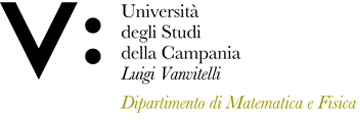Raffaele BUOMPANE
Insegnamento di FISICA GENERALE 1
Corso di laurea in MATEMATICA
SSD: FIS/01
CFU: 9,00
ORE PER UNITÀ DIDATTICA: 80,00
Periodo di Erogazione: Secondo Semestre
Italiano
| Lingua di insegnamento | ITALIANO |
| Contenuti | Metodo Scientifico. Cinematica e vettori. Principi della dinamica del punto materiale. Conseguenze dei principi della dinamica del punto materiale. Trasformazioni tra sistemi di riferimento in moto relativo. Terzo principio della dinamica ed equazioni cardinali della dinamica dei sistemi. |
| Testi di riferimento | C. Mencuccini e V. Silvestrini – Fisica : Meccanica e Termodinamica – Casa Editrice Ambrosiana. |
| Obiettivi formativi | Acquisire conoscenze di base e capacità di comprensione dei fenomeni di meccanica classica e della termodinamica; familiarizzare con il metodo scientifico di indagine, con la rappresentazione e l’analisi delle leggi fisiche, la modellizzazione di fenomeni della fisica classica. Acquisizione di competenze e metodologia di risoluzione di esercizi in cinematica, dinamica del punto materiale; statica e dinamica dei sistemi materiali e corpi rigidi, termodinamica. Esperienze di laboratorio e analisi statistica dei dati sperimentali: in questo contesto lo studente dovrà acquisire la capacità di utilizzare le conoscenze teoriche per progettare semplici esperimenti; |
| Prerequisiti | Propedeuticità: analisi 1 e geometria 1 |
| Metodologie didattiche | Lezioni ed esercitazioni |
| Metodi di valutazione | Esame scritto e orale, prove intercorso, relazione sulle esperienze in laboratorio didattico. L' esame scritto consiste di 3 esercizi di meccanica e uno di termodinamica da svolgersi in due ore. Il requisito minimo per superare lo scritto è di svolgere almeno due esercizi perfettamente, indicando chiaramente la procedura usata per lo svolgimento e portando a termine correttamente i calcoli numerici ove richiesto. Il risultato dello scritto sarà espresso con un giudizio: insufficiente, sufficiente, buono, distinto, ottimo. Il superamento dello scritto è un prerequisito necessario per accedere alla prova orale. Quest'ultima consiste nella discussione degli esercizi, dei principi fisici, dei teoremi e delle considerazioni teoriche come da programma. Durante l'orale si discutono anche le tesine relative alle prove di laboratorio, la partecipazione alle quali è obbligatoria per poter sostenere l'esame. Nella prova orale lo studente dovrà mostrare capacità di collegamenti critici, capacità di sintesi, qualità dell’organizzazione del discorso e dell’esposizione, uso del lessico specialistico, nonché capacità di approfondimenti. Il voto finale, pur considerando il giudizio della prova scritta, non sarà vincolato al risultato dello scritto. Le prove intercorso sono riservate agli studenti che seguono il corso con almeno il 70% di frequenza, a meno di casi particolari documentati. Esse consistono di almeno due prove svolte con la stessa modalità dello scritto relativamente al programma svolto fino a quel momento.Chi supera le prove intercorso sarà ammesso direttamente all'orale con un giudizio, mentre il voto finale sarà determinato da una prova orale di conferma su tutto il programma. |
| Altre informazioni | E' previsto un tutor a sostegno dell'apprendimento degli studenti. |
| Programma del corso | 1. Metodo Scientifico: considerazioni generali. |
English
| Teaching language | Italian |
| Contents | Scientific method. Kinematics and vectors. Principles of the dynamics of the material point. Consequences of the principles of the dynamics of the material point. Transformations between reference systems in relative motion. Third principle of dynamics and cardinal equations of material systems' dynamics. |
| Textbook and course materials | C. Mencuccini e V. Silvestrini – Fisica : Meccanica e Termodinamica – Casa Editrice Ambrosiana. |
| Course objectives | To acquire basic knowledge and understanding of classical mechanics and thermodynamics; to familiarize with the scientific method of investigation, with the representation and analysis of physical laws, the modeling of phenomena of classical physics. Acquisition of skills and methodology for solving exercises in kinematics, dynamics of the material point; statics and dynamics of material systems and rigid bodies, thermodynamics. Laboratory experiences and statistical analysis of experimental data: in this context the student will have to acquire the ability to use theoretical knowledge to design simple experiments; |
| Prerequisites | Prerequisites: analysis 1 and geometry 1 |
| Teaching methods | lectures and exercises |
| Evaluation methods | Written and oral exam, ad iterem tests, report on the experiences in the didactic laboratory. The written exam consists of 3 mechanical and one thermodynamic exercises to be performed in two hours. The minimum requirement to pass the written test is to perform at least two exercises perfectly, clearly indicating the procedure used for the performance and correctly completing the numerical calculations where required. The result of the writing will be expressed with a judgment: insufficient, sufficient, good, distinct, excellent. Passing the written test is a necessary prerequisite to access the oral exam. The latter consists of the discussion of exercises, physical principles, theorems and theoretical considerations as per the program. During the oral examination, the term papers for laboratory tests are also discussed, participation in which is mandatory in order to take the exam. In the oral exam the student will have to show the ability of critical connections, synthesis skills, quality of the organization of the speech and of the exposition, use of specialized vocabulary, as well as in-depth knowledge. The final grade, even considering the judgment of the written test, will not be bound to the result of the written test. The elapsed tests are reserved for students who attend the course with at least 70% attendance, unless documented special cases. They consist of at least two tests carried out in the same way as the written test relative to the program carried out up to that moment. Whoever passes the elapsed tests will be admitted directly to the oral exam with a judgment, while the final grade will be determined by an oral confirmation test the whole program. |
| Other information | A tutor is provided to support student learning. |
| Course Syllabus | 1. Scientific Method: general considerations. |








